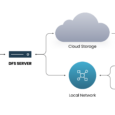
The small village, like most in France, has a cafe-restaurant, a hairdresser, a superette and a library.
Neighbours have a cup of coffee and a chat on the terrace, or meet up in the park or at the gym before heading their separate ways home.
But these are no ordinary villagers. Their average age is 79 and they all share a debilitating disease: Alzheimer’s.
Opened in June in the southwestern spa city of Dax, the Village Landais Alzheimer — named after the Landes department in which it is located — hosts 120 people afflicted with the cruel, memory-robbing ailment for which there is no cure.
For each resident, medical care-givers and volunteers — 240 people in total — are on hand to provide assistance with the daily tasks that for some have become impossible to manage on their own.
But this is no care home. Staff do not wear white coats and residents are given the freedom to pursue their individual lifestyles, in as far as that is possible.
“Each resident has their own room and live at their own rhythm. The one that rises at 6:00 am does not disturb the tranquility of the one that enjoys sleeping in,” Aurelie Bouscary, an assistant at the community, told AFP.
The village is just over an hour by train from Bordeaux and three and a half hours from Paris, and has a long waiting list of potential clients.
Challenging perceptions
Inspired by a similar project in the Netherlands, the trial at Dax is being closely watched by public health experts in Japan and Italy — countries with similarly ageing populations seeking new, more humane, frail care models.
A key aim of the village is to allow residents to maintain a close relationship with their loved ones and not become cut off from the world.
It seeks to allow for “daily interaction between the village and the outside world,” states the facility’s website.
“Indeed, the Landes project also wants to change society’s perceptions of Alzheimer’s disease. Raising awareness… of the behaviour caused by this type of dementia will help change the way it is perceived.”
[“source=indiatoday”]



